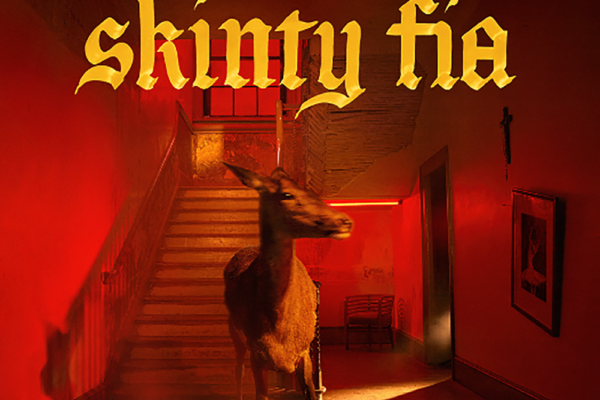What always struck me odd about the two-person band, and by two-person band I don’t mean Hall & Oates where they have five other people in the band that do not get any credit, but a band where there are always only two people in that band, is how do they grow as band? Most bands eventually bring in another person or two to expand their sound, or at least use them for touring purposes. When two people are playing two instruments, there seemingly is no room for growth. Or that’s what I think, and I could be wrong.
Royal Blood put out their debut record in 2014, and while they obviously have their own sound like most other bands, the record is more or less one style of rock, but it’s a great style and sound throughout. The 2017 released second one titled How Did We Get So Dark? was more of the same, with a little growth. That time they introduced keyboards sporadically in the proceedings. You can’t really expect too much from a band with only a bassist/singer and a drummer, and some nifty keyboards to change all that much.
Royal Blood has just recently put out their third record entitled Typhoons. This time around they have added some more keys, and also have added the aid of a couple of female background vocals. The band is still Mike Kerr – bass, keyboards, vocals, backing vocals, clav, and Ben Thatcher – drums, percussion.
Let me set this up for those of you who are not familiar with Royal Blood. Kerr, plays bass. But he plays bass unlike pretty much any other bassist that I can think of except for Death From Above 1979’s Jesse F. Keeler, a two-person band also, by the way. He plays his bass much like a guitar. If you watch the videos, you’ll notice that he plays his bass using chords like a guitar player would use. This is not The John Deacon “Another One Bites the Dust” school of playing bass (not that there’s anything wrong with that). The sound that he gets out of his bass is much akin to a guitar. So why not just play a guitar. My guess would be that they didn’t want to deal with the inevitable White Stripes comparisons, another two-person band, that the Black Keys would have to endure for half of their career (two-person band also).
Kerr plays through many different effects, and amps to achieve a sound that has him sounding like a duality of both instruments. You maybe asking yourself, “how does this work live?” I don’t know, but I can tell you it does. I saw them open for the Queens of the Stone Age at Madison Square Garden, which now seems like a life time ago, and I was blown away that the sound on the records is not lost on stage.
Ben Thatcher, to me, is the band’s secret weapon. The guy plays amazing drums, and unlike, let’s say, Meg White, of the White Stripes, does not leave the heavy lifting to Kerr, much like White left the heavy lifting to White. He fills in gaps and plays with so much energy that after you stop playing air drums you’ll be reaching for a cold drink.
That, my friends, takes us to the record. I confess, I was not thinking that things would be too different from the first two records.
I was wrong.
While like stated somewhere above, The Bloods have their own sound, but there is a sense of growth here, and be warned, if you love the first two records you might have a hard time with this one.
While this band has always had a grove to them, it’s even more apparent on Typhoons. The band has decided to broaden their sound, and with two people in the band there is only so much you can reach out to expand upon. The band might have taken their time off to consume elements of dance music, and do I dare say it…disco, focusing on the grove, but this time around they’re doubling down on that grove.
The first song on the record called “Trouble’s Coming” comes right out of the gate with a dance beat, and a bridge that would not sound out of place on most top 40 songs that, I guess are being played now? I have no idea, because the only time I listen to top 40 is when my nieces are passengers in my car. Right away you know that this album is going to be different. Even a song like the title track, which sounds like a traditional Royal Blood tune turns slightly into something different with addition of the female vocals.
The centerpiece of the record is “Limbo.” Some people will probably think that the band is stuck in limbo when they hear this song, but, man, I love this song. The first fifteen second will have you think that you put on one of those best-of-disco compilation, but then that song turns into pure Royal Blood. The footwork drumming done on this by Thatcher is insane. Proof that this band has two players that are not fooling around. The song is peppered with wooden percussions that give it a more atmospheric vibe. Then it slows down with a moody keyboard part that crashes into the last throbbing minute.
Another great track is “Boilermaker” that starts out reminiscent to the opening riff of wrestler Kevin Owens from the WWE entrance music. This one could have been at home on either of their past two records.
The record closes with “All We Have Is Now.” A ballad that is just Kerr’s voice and a piano. Like I said, this is a little different than the other two records. Although there is much Royal Blood thrashing to please even the most rigid fan.
I welcome that a band is looking to experiment with their sound and play with different textures and such. At a time when everything is just rehashed nonsense of what came before it’s nice to see something just a little different than what came previously. When a movie does well, suddenly there’s twenty of the same film. Same with books. TV shows? Please. Have you ever just scrolled through the channels? It’s a vast wasteland of retreads with moments of something different.
I’m not saying that Royal Blood has morphed into something different, and completely indistinguishable from their older records like David Bowie would do with each recording, and they did not transform like Radiohead did from Pablo Honey to The Bends, but the band has grown some, and good for them. Already looking forward to seeing what they do on the next one.
Follow Royal Blood on Facebook, Twitter, Instagram and Spotify and read our interview with Ben Thatcher HERE
Article: Carmine Basilicata






